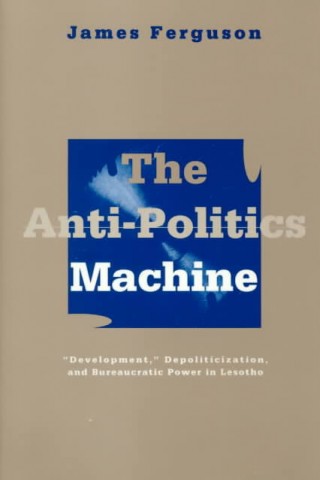Following an earlier post on the construction of "development", the following are thought provoking quotes from Ferguson's (1990) The Anti-Politics Machine on the practice of "development":
Context:
- "The argument, in brief, is the following: "development" institutions generate their own form of discourse, and this discourse simultaneously constructs Lesotho as a particular kind of object of knowledge, and creates a structure of knowledge around that object. Interventions are then organized on the basis of this structure of knowledge, which, while "failing" on their own terms, nonetheless have regular effects, which include the expansion and entrenchment of bureaucratic state power, side by side with the projection of a representation of economic and social life which denies "politics" and, to the extent that it is successful, suspends its effects. The short answer to the question of what the "development" apparatus in Lesotho does, then, is found in the book's title: it is an "anti-politics machine," depoliticizing everything it touches, everywhere whisking political realities out of sight, all the while preforming, almost unnoticed, its own pre-eminently political operation of expanding bureaucratic state power." (p. xiv-xv)
On being (a)political:
- "… just as the "development" problematic had misunderstood the economic structure of the "target population," in the same way it failed to appreciate the larger political-economic situation of the project itself as an instrument of the Government of Lesotho." (p. 193)
- "… the project did end up hiring many local people for unskilled work, chiefly in road construction and similar activities. This labor, which at the project's peak amounted to many hundreds of jobs, was recruited through the Village Development Committees. It was seen in Chapter 4 that these Committees were political organs of the ruling National Party, and it should thus be no surprise to hear that project jobs were often alleged to be preferentially allocated to National Party supporters. When I asked the Project Coordinator about this in 1983, he expressed what appeared to be genuine ignorance of the political role played by the Village Development Committees, and said that he had never before heard that they were associated with the ruling party. The project hired through the Committees, he stated, because the Government had told them to. "We can't afford to get involved with politics," he said." (p. 244)
On being uninformed:
- "…stock owners were usually reluctant to oppose the idea of improved stock in principle, but cited particular reasons why such a move was inappropriate for them. Several reasons were commonly cited. First, improved stock were said to be less hardy than the local animals - they would easily die off up in the mountains or when grazing got scarce. Secondly, they would need to be fed fodder, which would be very expensive. To grow one's own fodder, one would have to give up badly needed food… officials almost invariably recorded this opposition as a lack of understanding. Time and time again I was told by officials (whose own claims to power and authority, of course, rested on their education and technical expertise) that villagers who opposed their schemes lacked education, that they did not understand the proposals, that matters needed to be explained better." (p. 185-6)
- "Project planners came eventually to realize the impossible position they occupied. The "technical measures" the project was competent to implement, a 1978 appraisal noted, were of "little significance" without far-reaching structural changes that were beyond the power of the project to effect." (p. 191)
On failure:
- "The main reason for this was simply that the project had no legal power to restrict movement of livestock, limit numbers or restrict access to grazing. The planners seemed to have assumed that the project could divide up and regulate rangeland in any way it pleased, but under the laws of Lesotho it had no such right… In this context, the project had absolutely no authority to implement any of the grazing-control measures the early documents proposed." (p. 171)
- "… the Principal Chief of Rothe gave the Thaba-Tseka Project permission to start a grazing association for owners of small stock on 1,500 hectares of rangeland near the new town of Thaba-Tseka. By 1979, the area had been fenced, and a CIDA evaluation was able to claim that "the introduction of the first Graziers' Association in August 1979 in the mountains of Lesotho is considered to be an outstanding achievement of the TTIRDP" (CIDA 1979: 57). By the end of the next year, the fence had been cut or knocked down in many places, the gates had been stolen, and the association area was being freely grazed by all. The office of the association manager had been burned down, and the Canadian officer in charge of the program was said to be fearing for his life. In 1982, when I arrived on the scene, the project was being described by project officials as "a complete disaster." (p. 171)
1684 Hits

